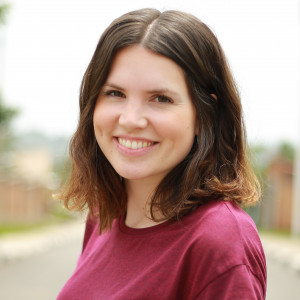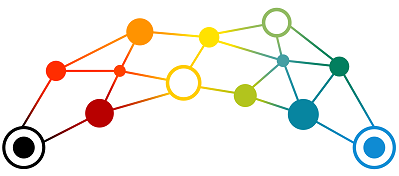
Welchen universitären Hintergrund haben Sie und wie haben Sie Ihren Weg in das StArfrica-Team gefunden?
Ich habe meinen Bachelor in Filmwissenschaft und Publizistik gemacht und war nach dem Abi erst einmal als Freiwillige nach Uganda gegangen, was mich nie wirklich losgelassen hat. Während des Studiums war ich für ein Austauschjahr am College in den USA und konnte politische Kurse nehmen, unter anderem zu Post conflict societies, wodurch ich mehr über Ruanda erfahren habe. Nach dem Auslandsstudium war ich als Praktikantin bei der GIZ in Uganda und als ich mit dem Bachelor fertig war, habe ich dann gemerkt, dass ich doch lieber in Richtung Entwicklungszusammenarbeit gehen will, habe das Filmstudium in den Hintergrund gestellt und dann meinen Master in International Studies in Wien gemacht.
What is your academic background and how did you find your way into the StArfrica team?
I did my bachelor’s degree in film studies and journalism and after graduating I went to Uganda as a volunteer, which never really let go of me. During my studies, I went to the USA for an exchange year at college and was able to take political courses, among others on post conflict societies, which allowed me to learn more about Rwanda. After my studies abroad I was an intern at the GIZ in Uganda and when I finished my bachelor’s degree I realized that I would rather go into development cooperation, so I put my film studies in the background and then did my master’s degree in International Studies in Vienna.
Seit wann sind Sie dabei, was sind Ihre Aufgaben und welche Erfahrungen bringen Sie mit?
Ich bin seit dem 15. August dabei und meine Aufgabe ist es, den Gründungsstandort Deutschland herauszustellen und für ruandische Startups attraktiver zu machen, aber eben auch deutsche Firmen nach Ruanda zu bringen und gegen das Stereotyp anzukämpfen, das nicht nur Ruanda, sondern der gesamte afrikanische Kontinent hat. Es geht darum, ein belastbares Netzwerk zu schaffen und in Zusammenarbeit mit der University of Rwanda und der Uni Koblenz-Landau einen Inkubator vor Ort in Kigali aufzubauen.
When did you join the project, what are your tasks and what experience do you bring with you?
I have been involved since August 15 and my task is to highlight Germany as a location for start-ups and make it more attractive for Rwandan start-ups, but also to bring German companies to Rwanda and to fight against the stereotype that not only Rwanda but the entire African continent has. The aim is to create a resilient network and, in cooperation with the University of Rwanda and the University of Koblenz-Landau, to establish an incubator on site in Kigali.
Wie hat das Pilotvorhaben Ihr Interesse geweckt? Was ist Ihre Motivation, daran teilzuhaben?
Ich finde die Idee hinter dem Projekt sehr spannend, dass der Fokus nicht auf “traditioneller” Entwicklungszusammenarbeit liegt, sondern es primär darum geht, vor Ort Arbeitsplätze zu schaffen und zu zeigen, dass Ruanda in wirtschaftlicher Hinsicht ein wichtiger Player auf dem afrikanischen Kontinent ist. Dass man zum einen zeigt: hier lohnt es sich hinzugehen und zu investieren, aber auf der anderen Seite den jungen ruandischen Startups die Möglichkeit gibt, nach Deutschland zu kommen, um dort zu gründen. Meine Hauptmotivation, an dem Projekt mitzuwirken ist Ruanda selbst, da ich seit drei Jahren immer wieder hinreise und von dem Land, den Leuten und der rasanten Entwicklung begeistert bin.
How did the pilot project arouse your interest? What is your motivation to take part in it?
I find the idea behind the project very exciting that the focus is not on “traditional” development cooperation, but primarily on creating local jobs and showing that Rwanda is an important player on the African continent in economic terms. That on the one hand it is shown that it is worth going there and investing, but on the other hand that young Rwandan start-ups are given the opportunity to come to Germany to set up their own business. My main motivation to take part in the project is Rwanda itself, because I have been travelling there again and again for the past three years and am enthusiastic about the country, its people and its rapid development.
Was verbinden Sie mit Ruanda? Waren Sie schon einmal in dort? Wenn ja, welche Erfahrungen haben Sie gemacht? Was hat Sie überrascht/erschreckt/begeistert? Falls nicht: Haben Sie vor, nach Ruanda zu reisen und wenn ja, was erhoffen Sie sich? Was zieht Sie an, was sind Ihre Erwartungen?
Ich war schon dreimal in Ruanda, zuerst mit einer Beratungsfirma und später dann, um meinen eigenen Verein zu gründen, mit dem wir Büchereien sowie die Aus-und Fortbildung von Jugendlichen im Nyabihu District fördern. Ich finde Ruanda ist der ideale Gründungsstandort. Es gibt wenig Korruption, die Politik des Landes ist wirtschaftsfreundlich und eine sehr gute Infrastruktur im Hinblick auf ICT ist gegeben.
What do you associate with Rwanda? Have you ever been there? If so, what experiences have you had there? What surprised/frightened/enthused you? If not: Do you plan to travel to Rwanda and if so, what do you hope to achieve? What attracts you, what are your expectations?
I have been to Rwanda three times, first with a consulting firm and later to found my own association with which we support libraries and the education and training of young people in the Nyabihu District. I think Rwanda is the ideal place to start a business. There is little corruption, the country’s politics are business-friendly and there is a very good infrastructure in terms of ICT.
Welchen Erfolg wünschen Sie sich für das Projekt StArfrica?
Ich wünsche mir, dass man die Attraktivität von Ruanda für deutsche Startups und Firme herausstellen kann und ebenso ruandische Startups nach Deutschland bringt, dass dadurch dann eine nachhaltige Brücke entsteht und beide Seiten wirtschaftlich miteinander kooperieren . Natürlich ist es auch das Ziel, Arbeitsplätze zu schaffen sowie jungen Ruandern die richtigen Skills mit zu geben, was die Anforderungen des Arbeitsmarkts angeht, denn das ist es, was Ruanda braucht. Ruanda ist verhältnismäßig jung, das Durchschnittsalter liegt bei rund 18 Jahren und diese jungen Menschen sollen die Möglichkeit haben, gute Jobs zu finden. Das ist so unglaublich viel Potential. Auch geht es darum, die Praxisbezogenheit der Forschung voranzubringen und vor allem liegt es mir am Herzen, die Vorurteile gegenüber Ruanda aus der Welt zu schaffen. Das Bild von Afrika ist bei vielen immer noch veraltet und voller Stereotype. Genau das wollen wir verändern.
What success do you wish for the StArfrica project?
I hope that Rwanda’s attractiveness for German start-ups and companies can be highlighted and that Rwandan start-ups can be brought to Germany, so that a sustainable bridge can be built and both sides can cooperate with each other economically. Of course it is also the goal to create jobs and to give young Rwandans the right skills to meet the demands of the job market, because that is what Rwanda needs. Rwanda is relatively young, the average age is around 18 years and these young people should have the opportunity to find good jobs. That is so much potential. It is also about promoting the practical relevance of research and, above all, it is important to me to dispel the prejudices against Rwanda. The image of Africa is still outdated and full of stereotypes for many people. This is exactly what we want to change.
